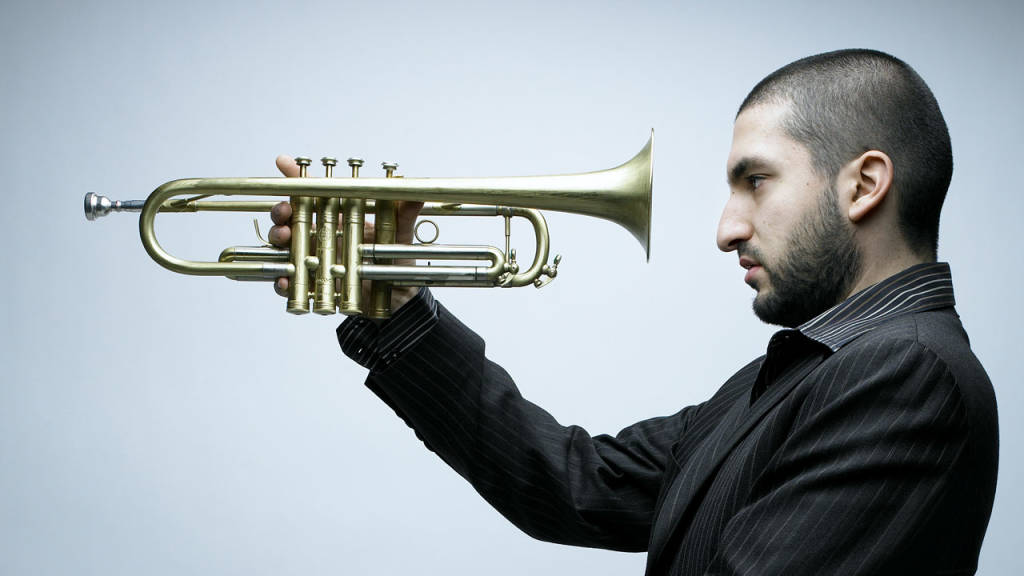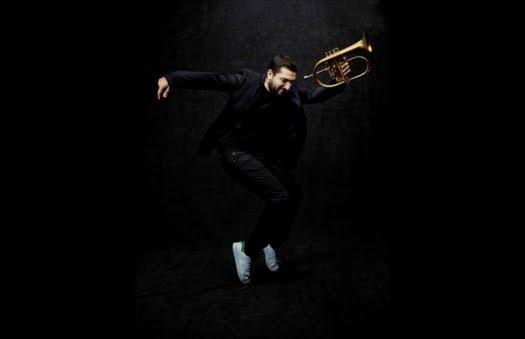Lebanese trumpeter Ibrahim Maalouf has been keeping busy. When he stopped in Beirut to prepare for his festival shows in Lebanon this summer, he took a few minutes to discuss his various projects, and muse about music generally. Beirut-born and Paris-raised, the musician and composer has become known internationally for his blend of oriental and western music, flavored with whatever inspires him at any given time.
“I have two albums that are about to be released in September,” Maalouf said. “One is the ‘Levantine Symphony No.1,’ which is a very big symphony I composed for my collaborative with the New Levant Initiative – a new and beautiful organization based in the U.S. to promote the Levant region.
“We did the world premiere at the Kennedy Center in March,” he added. “The other [album] is from a live concert at the Bercy Arena in Paris – the biggest concert hall in France – [where] we did a concert that was almost four hours.”
“Live in Paris 14.12.16,” he said, will feature a single modern symphony piece divided into parts. “A symphony is like a story,” Maalouf continued. “There are always things you expect but always things you never expected and in this symphony … there are lots of surprises.
“It’s with a children’s choir, my band that I play hard rock and jazz [with], alongside the orchestra, so it’s a fusion, which to me is the identity of the Levant,” he added.
“The Levant is not just one culture or identity [but] the mix of western and eastern culture and our other roots. There are so many layers we can share.” Though much of his music has jazz and blues overtones, Maalouf doesn’t consider himself a “jazz man,” finding it hard to fit within such cookie-cutter definitions.
“I understand that I can be associated with jazz and working in that field,” he explained, “but I see myself as a random person doing music and enjoying creating music of any kind.
“The world is being divided in two,” he added.
There are people fighting for tradition, trying to maintain integrity and not letting anyone violate their values, and there are others who are fighting for another vision of culture, which is diversity.
“There is a conflict between these two and it’s difficult to be in the middle of things but I think my music is in the middle of this. You can fight for a modern cultural view without losing touch with your roots and origins. You can be a traditional person living in the future.”
Maalouf is looking forward to developing this conversation with American jazz trumpeter and scion of tradition Wynton Marsalis, with whom he’ll perform one of his own compositions during a concert in Marciac, France, later this summer.
“Wynton is supposed to be the man who says ‘Jazz is this and not this,’” Maalouf observed.
“He’s very excited and I’m surprised because everyone is telling me Wynton [has a] very strict New Orleans style and is difficult to move from his current direction. But we’ve talked, he’s been very cool about it.”
Maalouf will spend most of August in Lebanon, being guest performer in Matthieu Chedid’s Baalbeck concert, Aug. 4.
He’ll then open the Batroun International Festival on Aug. 11.
“In Batroun I’ll be playing a tribute to Oum Kalthoum but a jazz version,” he said. “It’s something I’ve toured for two or three years. We’ve played about 200 places in the world but we’ve only done it one time in Lebanon.” When composing, he says his process varies depending on what he’s working on.
When working on his albums the strategy is random, reworking each piece until it takes shape. Movie scores, he says, are a much more involved process, being tailored to a director’s vision.
“I’m working on four movie soundtracks right now,” he said.
“Two of them are by French directors I’ve worked with before – Safy Nebbou and Mohamed Hamidi. Working on an album it’s just you, but in a movie you’re collaborating on a deep level and we talk about the scenarios and look for the best outcome for the movie.”
He recalls having worked on the score of Jalil Lespert’s 2014 feature “Yves San Laurent.” “The director was like, ‘I want you to compose something that nobody can hear.’ In the end I got it,” he said.
“You have to compose something that people don’t hear but if you take it away it sounds weird. You have to make something people will also remember though, and to speak to the heart instead of the ears.”
Maalouf plays a quartertone trumpet – which his father Nassim Maalouf is credited with having pioneered. The instrument plays half-sharps and half-flats that are characteristic of Arabic melodic scales and modes.
This modified trumpet has been embraced in Turkey and in Egypt, Maalouf notes, but he feels few outside Lebanon’s close-knit jazz community are fans of the instrument.
“Despite my father’s 40 years of lobbying, not many Arab people got into it,” he said, “which is a shame because the trumpet is a great instrument and quartertones are perfect for people who want to play both Arabic, contemporary or classical music. It can be played very loud but can also be very soft and smooth like a human voice.”
https://www.youtube.com/watch?v=vOWD4pmX7H8







More Stories
CD review: George Benson – Dreams Do Come True: When George Benson Meets Robert Farnon – 2024: Video, CD cover
The band was tight as ever. The Warren Haynes Band cuts loose: Video, Photos
Interview with Alvin Queen: Feeling Good – I heard these tunes played by … Video, new CD cover, Photos